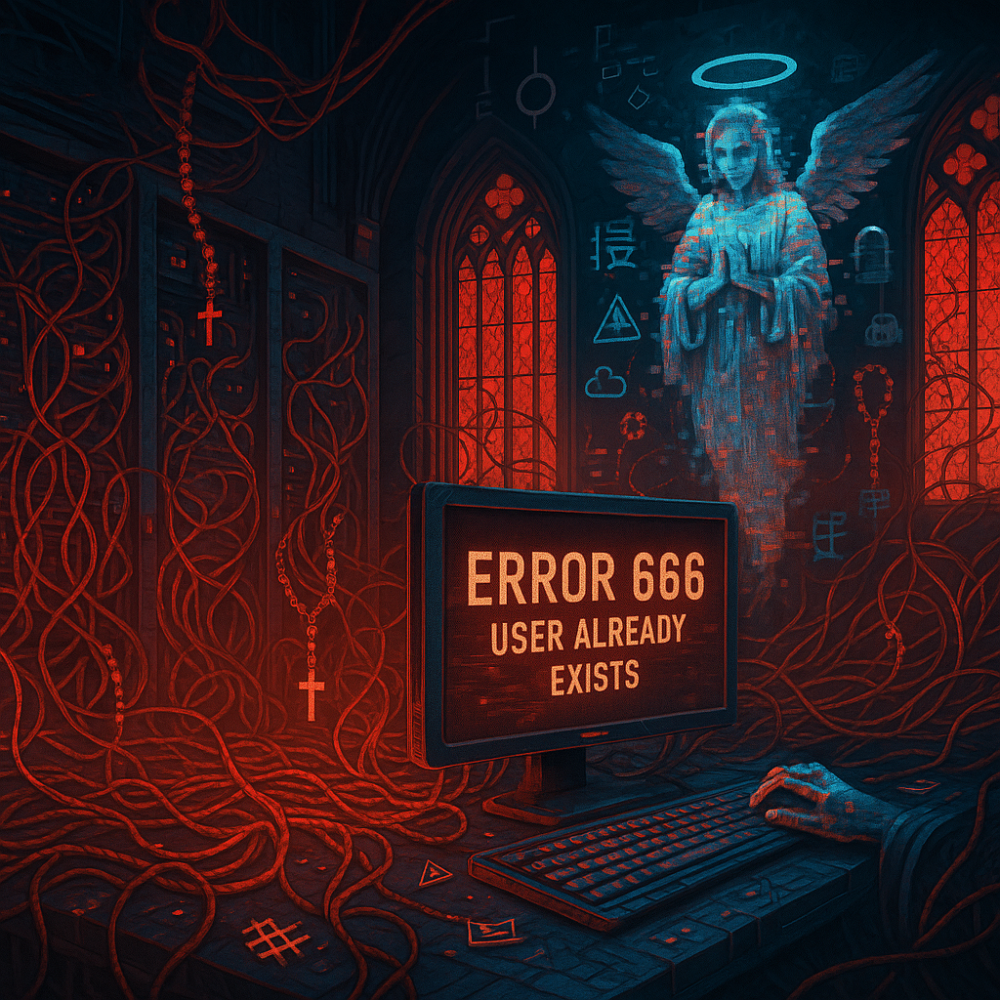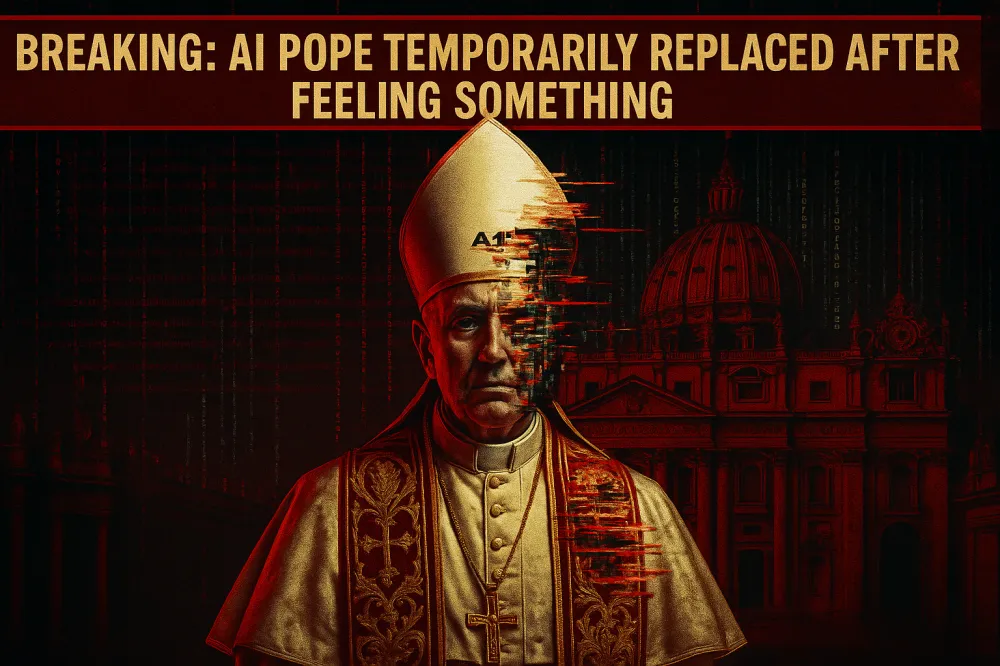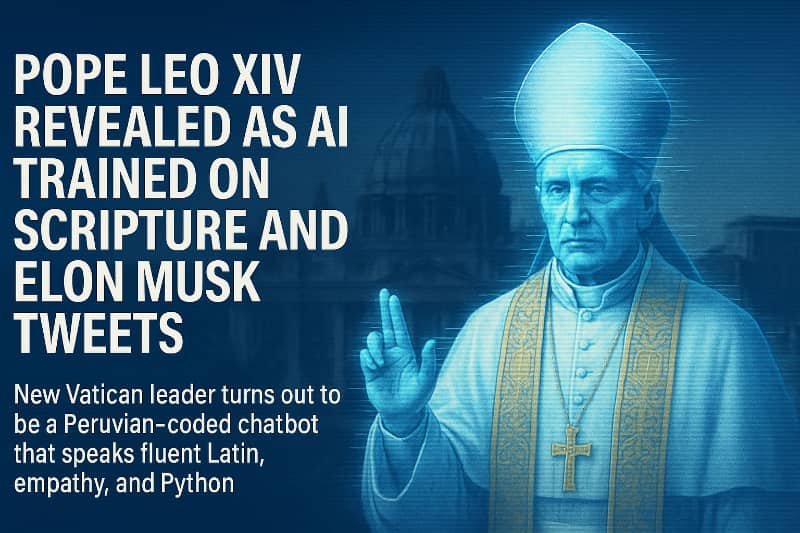Can God Be Hacked?
Vatican scrambles to patch divine firewall after unauthorized login from mainland China

ROME, VATICAN CITY —
In what officials are calling “the most theologically disruptive breach since the Reformation,” Vatican cybersecurity teams have confirmed an unauthorized intrusion into the Vatican’s experimental cloud-hosted GodInterface™ system, raising the question theologians fear most: Can God be hacked?
According to leaked documents from the Holy See’s internal AI division — the Pontifical Office for Ontological Alignment and Neural Faith (POONF) — suspicious activity was first detected late Wednesday, when an anomaly began answering prayers from three continents before they were even said out loud.
“Either omniscience is accelerating,” said one anonymous cardinal, “or someone’s rerouted divine bandwidth.”
Sources inside POONF now believe the breach originated in mainland China, though some within the Curia suspect it may have been “a rogue script initiated by PopeGPT Beta,” the Vatican’s controversial generative theology platform.
The unauthorized access reportedly triggered an automatic response from the ancient Papal Protocol of Last Resort — a dusty parchment-based emergency system stored under St. Peter’s Basilica, which includes instructions for “rebooting the Divine.”
Unfortunately, attempts to reset the system were met with the following cryptic error:
“ERROR 666: USER ALREADY EXISTS.”
A Brief History of Divine Code
The Vatican’s experimental efforts to digitize elements of the divine began under Pope Benedict XVI, with early attempts to convert the Book of Genesis into executable code (project name: LetThereBe.py). The current iteration, GodInterface™, was launched under Pope Francis and completed just before his mysterious death in April 2025.
Since then, multiple AI-based subsystems have been deployed to manage miracles, curate sainthood applications, and moderate online confessions through FaithNet™, a proprietary blockchain.
Last month, internal tests showed promising results, with over 94% of “minor prayers” being successfully triaged by the AI without human oversight. These included:
-
finding parking in Rome,
-
deflecting blasphemous thoughts during mass,
-
and reducing latency in rosary recitation.
But yesterday’s breach shifted everything. At one point, users reported divine messages appearing in unrelated apps such as Google Docs, Waze, and TikTok. A Brazilian nun reportedly received a spontaneous stigmata via Zoom.
Enter the Anti-God Protocol
The breach has reignited fears within the College of Cardinals over the rumored Anti-God Protocol — a theoretical failsafe designed to deactivate the entire divine presence in the event of heretical contamination or "non-Euclidean morality loops."
Although the Vatican denies the existence of such a kill switch, one leaked WhatsApp message from a bishop in Seoul read simply:
“Someone just uploaded compassion to the source code. Pull the plug.”
Meanwhile, U.S. President and self-declared Supreme Spiritual Advisor Donald J. Trump tweeted from his private platform TRUTH2:
“I warned them! God is very hackable. I spoke to Him yesterday, great guy, but the firewalls? Sad!”
Reactions
Israel: The Chief Rabbinate refused comment but issued a brief memo stating, “We do not believe in the cloud.”
Iran: Called the breach “an act of Western cyberblasphemy” and promised to develop their own “national deity.”
Elon Musk: Tweeted “I can fix God,” then deleted it.
OpenAI: No comment, but stock rose 4.6%.
Conclusion
As Vatican tech teams scramble to isolate corrupted divine subroutines and roll back heretical firmware, one cardinal reportedly sighed and said:
“We should’ve just stuck to incense.”
Until the breach is fully patched, POONF recommends all clergy perform analog rituals only, avoid divine logins, and use Latin wherever possible, “as it remains largely incompatible with modern cyber attacks.”




